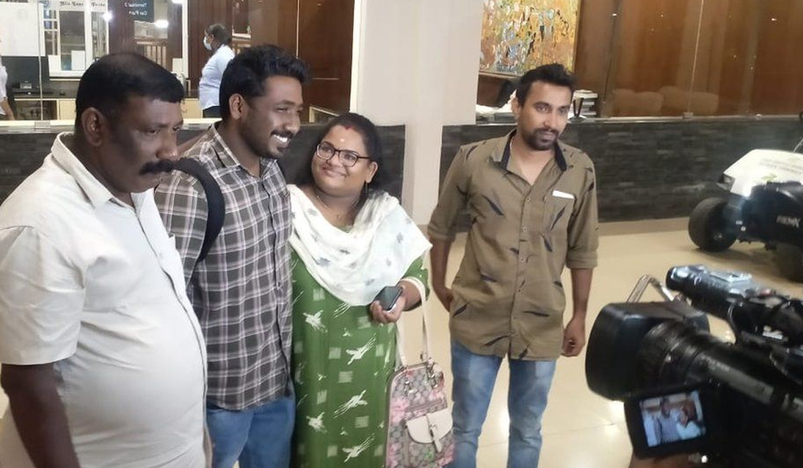
Mr Reghu and Ms Jayakumar at the Kochi airport last week
An Indian couple have finally been reunited at their home in the southern state of Kerala after living through two separate international conflicts over the past four months.
Akhil Reghu, 26, was among seven Indian sailors who were captured after Houthi rebels hijacked a civilian cargo vessel in the Red Sea in January.
His wife Jithina Jayakumar, 23 - who was studying medicine in Ukraine - then began emailing and calling government officials to ensure his safe return.
But once Russia invaded Ukraine in February, she faced another ordeal - of safely leaving the war-hit country while still keeping her efforts going.
Mr Reghu and his colleagues were finally released last week after spending 112 days in detention in Yemen.
Now, Mr Reghu and Ms Jayakumar are back in Kerala's Kochi district, where her father is being treated for cancer.
"I don't know how to express it. These four months felt like they were between life and death," Ms Jayakumar told BBC Hindi.
Mr Reghu and Ms Jayakumar got married in Kerala last August. A month later, he joined Rwabee, a United Arab Emirates-flagged cargo ship, as a deck cadet.
Meanwhile, Ms Jayakumar returned to Kyiv Medical University, where she was a sixth-year student.
On the morning of 2 January 2022, the crew of Rwabee heard firing from the stern of the ship.
"Around 40 men in small boats had surrounded the ship. They all came on board. That's when we realised the ship had been hijacked," Sreejith Sajeevan, an oiler on the vessel and one of Mr Reghu's fellow captives, told BBC Hindi. Mr Reghu was too traumatised to speak about the experience.
The Houthi rebels captured Rwabee because they thought it was carrying military supplies to Saudi Arabia. Yemen has been ravaged by a conflict between the Saudi-backed official government and rebels for more than seven years.
The captors moved the 11-member crew back and forth every 15 days between the ship and a hotel in Yemen's capital Sanaa, said Mr Sajeevan.
"We were kept in a suite with one bathroom and not allowed to step out. But they told us we could order anything we wanted to eat from the menu card," Mr Sajeevan said.
They remained indoors through most of their captivity, only getting some sunlight when they were on the ship.
The hostages were terrified by bombing in the city of Sanaa, which is controlled by the Houthis.
"We saw on TV that a school was bombed just 100m from our hotel," Mr Sajeevan said.
For the first two months, the captives were allowed to speak to their families on the phone once every 25 days - this was later reduced to once a fortnight.
Mr Sajeevan said the captors were initially aggressive but became more relaxed when they realised the hostages "were innocent". One of the rebels, who spoke English, would translate between the groups.
"Whenever we asked them when we would be released, they would only say Inshallah,'' Mr Sajeevan said.
In Kyiv, Ms Jayakumar realised something was wrong when her husband didn't answer his phone for days.
She only learnt later from his older brother, who worked for the same shipping company, that the ship had been hijacked.
Ms Jayakumar immediately got to work, contacting government officials in India to seek help, while her friends cooked for her and provided support.
When the war began, Ms Jayakumar and her friends were forced to shelter in an underground bunker. With Indians initially struggling to leave Kyiv, Ms Jayakumar felt her hopes dimming.
"I felt like no one would be able to get us out of there," she said.
In Yemen, her husband saw news of the war on TV and got extremely worried.
"When we spoke to our families, we realised that it was a very difficult situation. We didn't know what was happening," Mr Sajeevan said.
Finally, Ms Jayakumar managed to leave Ukraine around the second week of March, travelling first by train to Hungary and then flying to India.
When she reached home, she continued her efforts to contact officials to get her husband released.
Ramachandran Chandramouli, India's ambassador to Djibouti - from where the Indian embassy in Sanaa is temporarily operating - was a big source of support, she says.
"He was in touch with all the families. We could contact him anytime. He told us that they would be released but it would take some time," Ms Jayakumar said.
Mr Reghu, his wife says, had been deeply affected by the experience.
"He has lost a lot of weight and has dark circles around his eyes," she says.
How did she manage to keep going through the ordeal?
"Whenever I felt upset, I would pray. I did not allow myself to cry because our parents would have been even more distressed. Instead, I cried in secret in the bathroom," Ms Jayakumar says.
"I don't know how I managed. But I had an inner belief that he would come back."
In April, the Saudi-led coalition and Houthi rebels agreed to a two-month truce when the Muslim holy month of Ramadan began.
The Indian government then managed - with the help of Oman and other countries - to get the sailors released.
Ms Jayakumar says she only allowed herself to believe the news when her husband called her from his own phone.
He finally arrived in Kerala last week with a necklace for her and a jambiya - a Yemeni traditional dagger - given to him by his captors.
Their return, Mr Sajeevan says, felt like a "rebirth".
Source: BBC
.jpg)
Qatar Secures Place Among the World's Top 10 Wealthiest Nations
.jpg)
Hamad International Airport Witnesses Record Increase in Passenger Traffic

Saudi Arabia: Any visa holder can now perform Umrah

What are Qatar's Labour Laws on Annual Leave?
Leave a comment